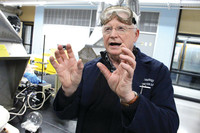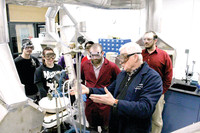A collaboration between the Community College of Rhode Island, the University of Rhode Island, and the Jackson Laboratory in Bar Harbor, ME proved incredibly exciting for professor Wayne Suits who …
This item is available in full to subscribers.
We have recently launched a new and improved website. To continue reading, you will need to either log into your subscriber account, or purchase a new subscription.
If you are a current print subscriber, you can set up a free website account by clicking here.
Otherwise, click here to view your options for subscribing.
Please log in to continue |
|



A collaboration between the Community College of Rhode Island, the University of Rhode Island, and the Jackson Laboratory in Bar Harbor, ME proved incredibly exciting for professor Wayne Suits who teaches organic chemistry and chemical technology.
"It addresses one of my perennial fantasies, and that is to have my organic students synthesize something like an orphan drug that is not only valuable but also addresses a societal need," Suits said in presentation on the collaboration.
Suits and his students worked with URI Professor Brenton DeBoef on the synthesis of a novel Alzheimer's drug called PS 48, allowing them to create a product that rather than being thrown away, could be used in further medical research.
"The FDA would never allow drugs produced by students to be used in medical treatment. However stepping this model back one level, we see there are viable opportunities for undergraduates at colleges and universities to use their training in organic chemistry to create important molecules to be used in medical research," Suits said. To Suits' knowledge, this is the first time a project of this type has been done at CCRI.
The collaboration developed three years ago when Suits first started encouraging his Chemical Tech. III students to apply for the Summer Undergraduate Research Fellowship program centered at the University of Rhode Island. SURF provides paid, summer-long research opportunities for undergrad students to work on in-depth research projects in different disciplines under supervision of mentors from area colleges and universities.
His student Joelle Bitar was accepted into the SURF program and chose to work on the synthesis of PS 48 with DeBoef. DeBoef was attempting to synthesize a large quantity of this substance so that it could transition from the "in-vitro" testing phase, where it showed great promise in reversing Alzheimer's disease, to the "in-vivo" phase where it would be tested on trans-genetic mice that possessed Alzheimer's disease.
Suits said that PS 48 is commercially available from chemical suppliers, but sells for $12,000 per gram (primarily due to the large number of lab hours required for its four step synthesis), which hindered advancement of the research project. Thus, DeBoef decided to synthesize his own PS 48 at a reduced course.
By the end of the summer SURF Program, Suits said Bitar and DeBoef succeeded in making only a few milligrams of the product at step three and were unable to produce any PS 48. Despite their inability to produce substance, Suits became excited about an opportunity he was envisioning when he spoke with Bitar about the project and studied the multi-step synthesis of PS 48; If the upcoming Chemical Technology IV class were allowed to incorporate the four step synthesis of PS 48 as a capstone lab experience, they could help advance DeBoef's research project and also enrich their own curriculum by providing students with an "authentic research experience."
"After the poster session, I immediately wrote a letter to Prof. Brenton DeBoef asking his permission to allow the ChemTec IV class to collaborate with him on the synthesis. He agreed and we started to work on the synthesis immediately," he said.
In the first phase of the collaboration, chemical technology students are involved with synthesizing a material that that has been shown to be effective at reversing Alzheimer's disease in vitro. In the second phase, the material is sent to URI so it can be analyzed for structure confirmation and purity. In the third phase, the material is delivered to Jackson Labs where it is tested on mice genetically engineered to possess Alzheimer's disease.
"To say that this project made the students lab experience more exciting would be a gross understatement. The labs became electric and the student excitement was palpable," Suits said.
Though the original class graduated before the project was completed, their efforts allowed the next class, the class of 2015, to successfully synthesize a little over 10 grams of PS 48.
Suits said the success of this collaboration was instrumental in Deboef's securing an NSF grant in which reference to "a joint research and training program with the Community College of Rhode Island" and the Chemical Technology Program is made several times.
PS48 is not only the focus of Alzheimer's research but also the focus of other research projects, including; researchers at Brandeis University observing that PS48 can trigger the death of cultured human cancer cells; research projects that study the effect that PS48 has on to stimulate the conversion of human somatic cells to stem cells that closely resemble embryonic stem cells; and, as a an activator of PDK1, PS48 is being used by researchers to elucidate the role of Type 2 diabetes in vascular disease.
Moving forward, the Chemical Technology Program will continue to synthesize PS 48 as a capstone activity during the last semester of the program and ultimately donate the drug to support varied research activities. Suits said Chem Tech students will continue to be strongly encouraged to participate in the SURF program, and projects will be evaluated for future research collaborations.
Suits said none of the project could have taken place without "the wonderful support" of chemistry chair Dr. Elizabeth Arendt, Dr. Peter Woodberry and paraprofessional Ms Jodie Bluto, who incidentally is also a Chem Tech Graduate.
"I think those of us who work in chemistry departments at 4-year colleges could learn a lot from the Chem Tech program," DeBoef wrote in a letter of support for the program. "It appears to be overwhelmingly successful in training students with the practical skills that enable them to successful in modern research and industrial laboratory."
Comments
No comments on this item Please log in to comment by clicking here